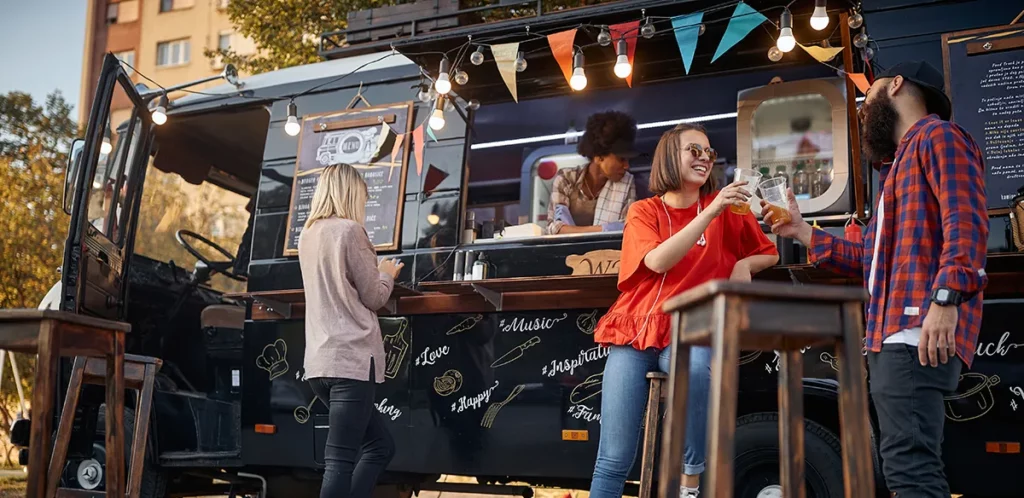Maine is known across the world for its lobsters and world-class seafood, so it comes as no surprise that this culinary hub is also a prime spot for the growing food truck industry.
If you’re wondering how to start a food truck in Maine, this guide is for you! Discover everything you need to establish your business in the Pine Tree State, from essential licenses to liability insurance.
Learn Requirements for Food Trucks in Maine
Maine requires food truck business owners to meet a few requirements before applying for licenses and serving hungry customers:
- Business name: Create a name for your business that clearly conveys what kind of food you sell while still being creative and catchy. Ensure it’s easy for customers to remember.
- Business classification: Choose between structuring your business as a sole proprietorship (most common for food trucks), limited liability company (LLC), partnership, etc.
- Employer identification number (EIN): Register with the Internal Revenue Service (IRS) to get this number, which they use for tax reporting.
- Certificate of Insurance (COI): Once you purchase insurance for your business, you have access to this document that includes essential info about your coverage. Commissary kitchen owners and event managers often ask to see this as proof of insurance.
- Business plan: Your business plan is the recipe for your success. It contains info like your mission statement, branding, sources of funding, and other critical information.
Acquire Maine Food Truck Licenses
Maine has several licenses and permits food trucks need to obtain before they can operate legally within the state.
It’s crucial to remember that while some licenses are required at the state level, many vary depending on what city or county you operate in. Check with the local government of any area where you plan to run your business, even for a temporary event.
Business License
- Officially recognizes your business in the state of Maine
- Cost: Varies depending on your location
- Where to get it: Your town/city office via the Maine.gov Local Government Portal
Health Inspection Program (HIP) License
- Required for mobile food units like food trucks that prepare and serve food for immediate consumption
- Cost: $20 per year
- Where to get it: State of Maine Health Inspection Program
Certified Food Protection Manager (CFPM)
- Food trucks must employ at least one CFPM trained in food safety and handling best practices
- Cost: $65
- Where to get it: 360 Training
Person in Charge (PIC)
- A PIC trained in food safety must be present in your food truck during operating hours
- Cost: $65
- Where to get it: 360 Training
Follow Maine Food Truck Laws
While cities and counties pass their own laws, there are state-wide food truck regulations in Maine you must follow. If you break these laws, your business may face a fine, suspension, or permanent closure.
Some key laws to be aware of are:
- Mandatory health inspections: All Maine food trucks are subject to regular health inspections, including a pre-operational inspection before they officially open for business. Your local health department officials conduct these.
- Employee health policy: All food businesses, including food trucks, must follow employee health protocols established in the Maine Food Code. During your pre-operational health inspection, your inspector will review employee health policy documents with you.
- Commissary requirement: Food trucks that are not deemed “self-sufficient” by your health inspector will need to rent a commissary kitchen for food preparation and equipment cleaning. Your truck is considered self-sufficient if you can prepare food and wash dishes and cooking utensils in it.
- Consumer advisory: If you serve any raw or undercooked animal products, you must place an asterisk next to that menu item and add a footnote with this warning: “Consuming raw or undercooked meats, poultry, seafood, shellfish, or eggs may increase your risk of foodborne illness.
Pro Tip: Prepare for your first visit from the health department with our handy health inspection checklist!
Get Maine Food Truck Insurance
Imagine a customer gets sick from food you served them or you accidentally damage a venue’s property while parking your truck for an event. You could be held liable to pay the resulting expenses.
That’s why food truck liability insurance is a critical part of your business — it can cover some or all of these costs so you don’t have to. Plus, many food truck rally and event managers require you to have insurance before they accept your application.
Maine food business insurance from Food Liability Insurance Program contains the coverages you need to keep your food truck safe from the financial burden of claims. When the average food truck claim costs $6,271, you’ll be glad you have insurance if something goes awry!

Understand the Cost of Starting a Food Truck in Maine
According to the U.S. Chamber of Commerce, food truck owners spend $28,276 on average for permits and licenses needed to get their businesses up and running.
There are other expenses you must account for in your budget and your pricing strategy, including:
- Food truck
- New: $75,000–$150,000
- Used: $30,000–$70,000
- Cooking equipment
- Grill/griddle: $800–$3,000
- Deep fryer: $500–$2,000
- Oven: $1,000–$4,000
- Generator: $500–$3,000
- Refrigeration
- Refrigerator/freezer: $1,500–$4,000
- Prep table: $1,000–$3,000
- Safety and sanitation
- Commercial sink: $500–$1,200
- Handwashing sink: $200–$500
- Fire suppression system: $2,000–$5,000
- Technology
- Point of Sale (POS) system: $600–$2,000
- Inventory management software: $30–$100 per month
Pro Tip: Check out our buyer’s guide on how to pick the best generator for your food truck and make sure you’re getting the most bang for your buck!
Attend Maine Food Truck Festivals
Food truck festivals in Maine are an effective way of gaining exposure to a large number of hungry customers. Plus, you’ll meet other food truck vendors in your area and establish yourself in the community.
Some food festivals to check out include:
- Congdon’s After Dark
- Machias Wild Blueberry Festival
- The Great New England Food Truck Festival
- Maine Lobster Festival
For more foodie events in your state, check out our festival directory.
Pro Tip: When you’re new to the food truck scene, it can be difficult to get your truck into events. Follow our tips to getting accepted into food truck festivals and increase your chances!
FAQs About Starting a Food Truck Business in Maine
Do You Need a License to Sell Food in Maine?
Yes, but the type of license you need depends on your food business. Food trucks and restaurants need a Health Inspection Program (HIP) license because they prepare and serve food to be eaten immediately, while vendors selling prepared, packaged foods need a mobile vendor license.
Are There Specific Zoning Regulations for Food Trucks in Maine?
Yes, though exact regulations vary by city. A few common zoning laws in Maine include:
- Proximity restrictions: Some cities prohibit food trucks from parking within a specified distance from restaurants
- Operating hours: Food trucks may be prohibited from operating during certain times of day (usually late night/early morning)
- Parking limitations: Food trucks face parking restrictions in any city, but some cities designate food truck zones where they have access to pedestrians without blocking traffic
What Are the Fire Safety Requirements for Food Trucks in Maine?
The fire safety regulations your food truck must meet can vary slightly depending on where you live, but generally include:
- Fire suppression system
- Class ABC fire extinguishers for general use
- Class K fire extinguishers for grease fires
- Fire safety training for all employees
- Regular electrical and fuel line inspections
- Proper fuel storage

Alex Hastings
Seattle-based copywriter and (WA) licensed insurance agent Alex Hastings leverages her experience as a lover of fast-casual food, baked goods, and iced oat milk lattes. She holds a B.A. in Creative Writing from Western Washington University. Before working at Veracity, she was a retail copywriter at Zulily and an English language teacher in South Korea. Alex is fully trained on FLIP insurance coverages and writes content that connects food and beverage business owners with the policies they need.
Seattle-based copywriter and (WA) licensed insurance agent Alex Hastings leverages her experience as a lover of fast-casual food, baked goods, and iced oat milk lattes. She holds a B.A. in Creative Writing from Western Washington University. Before working at Veracity, she was a retail copywriter at Zulily and an English language teacher in South Korea. Alex is fully trained on FLIP insurance coverages and writes content that connects food and beverage business owners with the policies they need.

Kyle Jude
Kyle Jude is the Program Manager for Food Liability Insurance Program (FLIP). As a dedicated program manager with 10+ years of experience in the insurance industry, Kyle offers insight into different coverages for food and beverage business professionals who are looking to navigate business liability insurance.
Kyle Jude is the Program Manager for Food Liability Insurance Program (FLIP). As a dedicated program manager with 10+ years of experience in the insurance industry, Kyle offers insight into different coverages for food and beverage business professionals who are looking to navigate business liability insurance.


